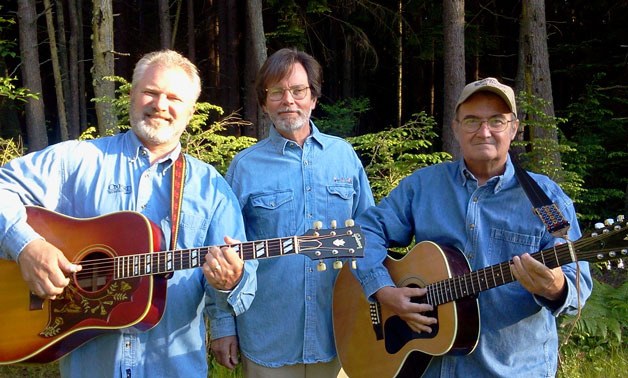GREENBANK — Forty-eight years ago, a group of upper Midwest teenagers got together on a summer’s day to play some folk music.
It was the era of a folk music revival influenced by singers such as Woody Guthrie, The Kingston Trio, Pete Seeger and the Weavers, Peter, Paul & Mary and Bob Dylan.
Greenbank resident Al Benson didn’t know then that that auspicious day in Minneapolis/St. Paul, Minn. would shape the rest of his life.
The group of three teens formed the Northstar Singers, a band that became deeply ensconced in the American folk music scene from 1964 to 1970, until the war in Vietnam put a chink in the band’s plans.
This past June, Benson self-published the “Northstar Singers Songbook.” The book is a singer’s and guitar players’ collection of the Northstar Singers’ song sheets and a brief narrative which includes Benson’s memories of that period — complete with photos, set lists, gig schedules, flyers and other memorabilia of the band’s experiences — as well as a personal view of the folk music era. The book comes with a digitally remastered CD of a Northstar Singers’ 1968 studio album.
“I am not concerned with having the songbook be a commercial venture,” Benson said.
“Instead, I simply want to share it with young people who want to pick up a guitar and sing without the pressure of having a great voice or instrumental skill.”
“Folk music is meant to be enjoyed with all its imperfections,” he added. “I am also sure there are many people around, like myself, who remember the fun of singing folk songs in the 1960s and would like to rekindle those sounds for themselves and their families.”
By “imperfections,” Benson meant the spontaneous culture of folk music, which embraces the changes that happen naturally when one person passes a song onto another. The Kingston Trio broke the trend of reproducing a song exactly the way it had been written, often adding their own arrangements to well-known songs.
Benson said folk music gave him and fellow band members, Dan Nelson and Tom Pederson, the freedom to make the songs their own. It wasn’t about being able to sing a song perfectly, Benson said, but about putting one’s own stamp on a song.
The band took old gospel songs, bluegrass standards and newer pop songs and adapted the lyrics and harmonies to make a “Northstar” version of a tune. Songs as diverse as “Salty Dog Blues,” “Ride Up,” “Darlin’ Corey,” “House of the Rising Sun,” “Yesterday” and “They Call the Wind Mariah” peppered the band’s repertoire.
It was an exciting time to be playing music; the era of Lyndon Johnson and the start of the civil rights movement. It was before the war in Vietnam had started, and audiences were getting out to hear folk music often.
“We would come to the coffeehouses on weekends and they’d be crowded; and this was all around the Twin Cities,” Benson said.
“We loved playing those places. People would listen to you. It was not like the bars.”
The popular interest in folk music spread a culture of involvement, Benson said.
“We all became active in our communities.”
The band also kept learning new songs and continued to expand its repertoire through the ’60s, singing at venues throughout the Midwest. A favorite gig was college coffeehouses like the No Exit at MacCalester College and the Scholar at the University of Minnesota, a place Dylan had played before he moved to Greenwich Village in New York City.
The Northstar Singers were often invited to play at hootenannies, which were singalongs held in fellowship halls at neighborhood churches. On the road they met other bands like the Landsmen and the Flinthill Singers of Edina, Minn. whose claim to fame was that John Denver had once been a member of the band. They were also featured on “The Folkswingers,” a television show produced by KSTP-TV in 1965.
The band kept going strong until the Vietnam War’s first draft lottery of the late ’60s forced the musicians to go their separate ways.
“I was lucky. I got a high number — No. 331,” Benson said.
He didn’t have to go.
“But a lot of the guys I knew in school and from around the neighborhood went off to Vietnam.”
After the war was over, Benson, Nelson and Pederson moved to different parts of the country to continue their lives; to start careers and families. Forty-five years later they decided to get together for a Northstar Singers reunion in September 2010 at the KSTP-TV studios in Minneapolis. Another reunion followed in June, when Benson, Nelson and Pederson met on Whidbey Island to record a reunion album, “Greenbank Jam.”
Benson said he has never stopped singing since that summer’s day in 1963, and still performs with various choral groups in the region. Now, he’s hoping to pass the songs and history on to a new generation.
“I sense a surge of folk music going on. I would like to see young people involved in folk music.”
For Benson, the book is a compilation of what the folk music movement meant to him.
“It was sharing and singing music,” he said.
And that’s who the book is for: the people who want to sing and share music.
“That’s who I’d love to have this songbook,” Benson said. “That’s who will enjoy it.”
The Northstar Singers Songbook and CD costs $24.95 and is available at Joe’s Island Music in Langley and Anchor Books and Coffee in Clinton.
Email Benson at al.benson@whidbey.com for more information.


